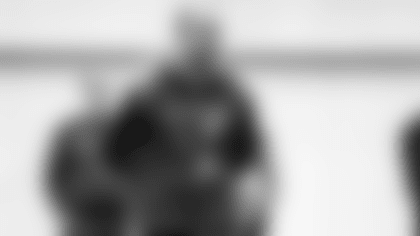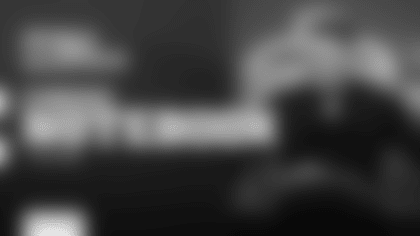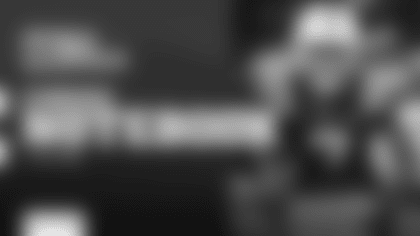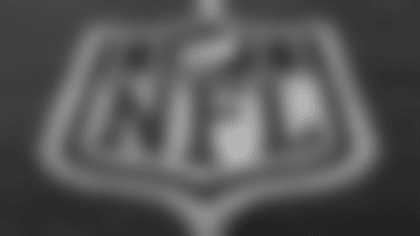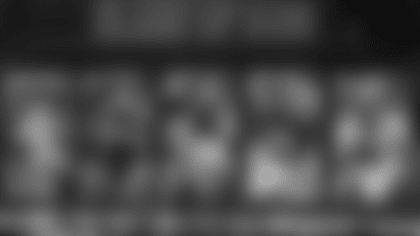INDIANAPOLIS —Not quite sure what Anthony "Booger" McFarland will be like in his new role as a field analyst on Monday Night Football?
You've come to the right place.
McFarland this week* *was a guest on Colts.com's "Colts Daily Update" podcast, in which he touched on a number of topics, from his rising career as a broadcaster, the changes to Monday Night Football, his time spent as a Super Bowl-winning defensive tackle with the Indianapolis Colts and what his former head coach with the Colts and the Tampa Bay Buccaneers, Tony Dungy, means to him.
But if it's football analysis you want out of McFarland, he certainly had plenty to say about his observations of the current Colts team as it moves forward with a new leader in head coach Frank Reich.
A little background: McFarland was a standout interior defensive lineman starting back in 1999, when he was a first-round pick of the Buccaneers. He'd play with the Bucs for parts of eight seasons, winning a Super Bowl title with the team in 2003 — before he was traded to the Colts at the deadline in 2006.
An ideal three-technique for an Indianapolis defense in dire need of one, McFarland made an instant impact. In 11 games during the 2006 regular season he had 33 tackles and 2.5 sacks, and he was a key piece for a surging Colts defense that put the clamps down throughout the playoffs that year. McFarland had two postseason sacks, including a takedown of Chicago Bears quarterback Rex Grossman in Indianapolis' 29-17 victory in Super Bowl XLI.
So to say McFarland knows a thing or two about the 4-3 defense, particularly how it's done up front, would be an understatement.
And after getting away from that system and playing primarily in a 3-4 from 2012 through 2017 during former head coach Chuck Pagano's era, the Colts are transitioning back to the 4-3 this offseason under Reich and first-year defensive coordinator Matt Eberflus.
McFarland spelled out what the Colts will need to make that transition successful, essentially echoing what Eberflus and general manager Chris Ballard have been harping all offseason.
"Well, you better have a guy playing the three technique that can disrupt and get up the field," McFarland said. "You better have a defensive end or two that can rush the passer. You better have a couple linebackers that can play sideline-to-sideline."
That three-technique position remains a bit of a mystery for the Colts as they head into their first day of OTAs today. In switching from the 3-4 to the 4-3, there are returning players who will certainly get a chance to fill that role — guys like Hassan Ridgeway, Grover Stewart and Al Woods — but several others are going to get reps, as well.
But no matter who lines up at that position — or the 10 other spots on the field — McFarland hopes the change back to the 4-3 represents a shift in attitude for the Indy defense.
"If you're going to make the transition and become a more physical football team, become a tougher football team, I think it's going to start on the defensive side of the ball," he said. "And you're talking about a 4-3 defense that is not a defense that is gonna trick anybody — you're gonna line up and you're basically gonna play and be in the same spot, and you're gonna have to make some plays. And I think football's about execution; it's about the ability to know your job, know what you're supposed to do and be better than the guy in front of you. And I think playing this 4-3 defense they're gonna get an opportunity to do that.
"But they've gotta be better, man." McFarland continued. "They've gotta be a lot more physical and a lot tougher, because, you know, if you watched the Colts the last four or five years, I think the one word I would use to describe this team is they've been soft."
You can listen to McFarland's entire interview above, but here are some other highlights from the conversation:
On the huge opportunity to join the 'Monday Night Football' crew:
"I think that the job is obviously a huge job — I'm looking forward to it — but once the lights come on, for me, it's football. I enjoy looking at the game from my perspective, and I'm gonna enjoy kind of giving our viewers a kind of a deep dive inside how I look at football. And so, you know, it's a big platform, it's a huge stage, but once the lights come on, man, it's just football, whether it was college the last four years that I've done or now pro."
On if he ever thought he'd be in broadcasting when his playing career was over:
"No, I never thought about it, man. I retired in '07 and I started my family, got married, kids, the whole nine (yards). And, you know, all of a sudden one day a buddy of mine hit me up and said, 'Hey, we're starting an FM sports station here in Tampa, and I think you'd be good at it. Come audition and see what you're like.' And I came over and I liked it, and I started doing local radio in Tampa — you know, talking about the Rays, the Bucs and the Lightning — and that led to me getting an opportunity to do some work on the SEC Network, and from there I just kind of continued to grow, man. But I never thought about, 'One day this could be me.' I just happened to get a phone call from a friend, and the opportunities just continued to come my way, and the best piece of advice I was given along the whole journey — and it's one of the reasons why I really enjoy doing what I'm doing — is they said, 'Just be yourself. You know, we hired you because you're you; we hired you because we like what you do and like the perspective that you bring.' And so, for me, I've always enjoyed it, and I never looked forward to it, but now that I'm in it I'm definitely grateful and very, very blessed to be a part of this crew."
On how he's been able to make the climb through the ranks as a broadcaster:
"I think what I've been able to do is fit in a lot of different scenarios and be very versatile. And, for me, it comes natural because I'm a sports fan. It's not like I have to go and study up on sports. Like, if I wasn't doing Monday Night Football, guess what — I'd still be watching Monday Night Football. I'd still be watching the National Football League. I'd still be watching sports, because I'm a sports fan."
On his memories of playing for the Colts:
"Well, for me, coming in, it was amazing to me how young the team was when I got there, especially on defense. And, you know, my role coming in was (to) just kind of be myself; be a defensive tackle, but also to kind of show some leadership and provide some leadership to some of the young guys. And to come in there and to just be myself and have some of the young guys, like an Antoine Bethea, like a Bob Sanders, like a Robert Mathis — you know, guys that have played a lot of football, but they were still relatively young from a standpoint of, 'How do we go about winning; how do we do it consistently?' And I enjoyed it. That magical run in '06 was tremendous. I just remember the most profound moment that we had was when, you know, we lost (three of four games down the stretch), and I'll never forget a reporter — it might've been (Bob) Kravitz; I can't remember — … who asked Tony (Dungy) in the press conference after losing (three of four), 'What are you gonna change?' Tony's like, 'We're not gonna change anything. You know, defensively we weren't playing well; we're just going to do our job and do it at a higher level.' And that's one of the most profound moments not only in that season, but in life. Because sometimes it's not about changing and revamping and doing things differently. Sometimes it's about doing things better. And that moment there, we did our jobs better and we went into the postseason, we beat Kansas City, we beat Baltimore, and then, just like anything in life, you're gonna have to get by your nemesis, and for us to get by New England, at home, in the RCA Dome, to get an opportunity to go to the Super Bowl, it's so many little lessons and nuances about life that I learned. But that moment, where Tony answered like, 'Hey — we're not changing. We're just gonna do our job better,' is one of the more profound moments not only during that season, but I still think about it every day in life."
On what Tony Dungy has meant to him:
"Everything. Just because Tony's a guy who not only prepared you to play football on Sunday; he prepared you to live life every day. And I think when you have young guys who are between the ages of 20 and 30, mostly, playing football, and, you know, we've got a lot of money, we've got a lot of time, we're starting families, you know, we're trying to understand what life and being a man is all about. Tony meant everything, because he taught you in so many different forms and facets of life about life, and I think that's the thing why Tony is so beloved, not only in Indy but in Tampa and wherever he goes, is because very rarely in life do you have someone that can share with them the knowledge with you that will cover a plethora of topics — not just football, not just being a dad, not just being a husband, but life. And Tony, to this day, still means the world to me."




